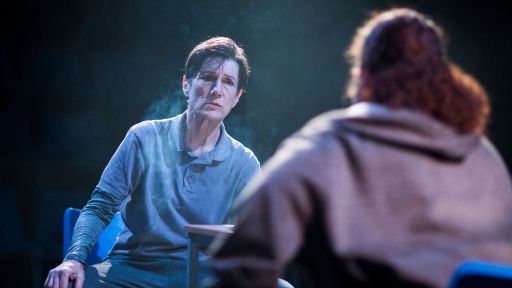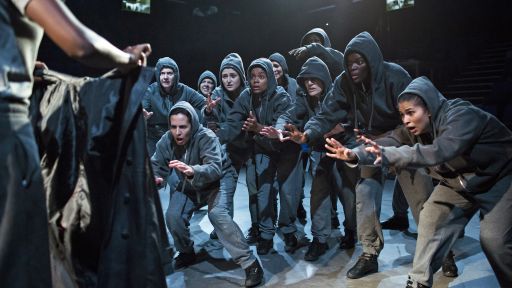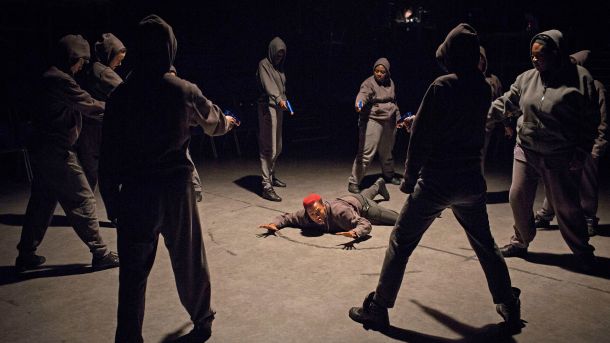
Jade Anouka (Mark Antony) and Company in Julius Caesar. Credit: Helen Maybanks
By Britt Stigler for ALL ARTS
“Only 15 percent of women in prison are there because of violent crimes. Over half have been victims of domestic abuse. And that’s partly my story. I retaliated, finally.”
These lines are among the first spoken in Phyllida Lloyd’s heavy metal, stark, contemporary take on Shakespeare’s “Julius Caesar.” Set in a women’s prison, Lloyd’s vision of the Bard’s tragedy proceeds as a play within a play, teasing out the similarities between modern incarceration and Caesar’s authoritarian reign as imagined by Shakespeare through a careful layering of language and imagery from both worlds.
The production, starring Harriet Walter, saw its premiere in 2012 at London’s Donmar Warehouse and is the first in Lloyd’s trilogy of Shakespeare plays, all of which are placed within a prison and led entirely by an all-woman cast. To mark the U.S. broadcast and streaming debut of “Julius Caesar” on GREAT PERFORMANCES, we spoke to Lloyd about her decision to set the production in a prison and the enduring resonance of “Julius Caesar.”
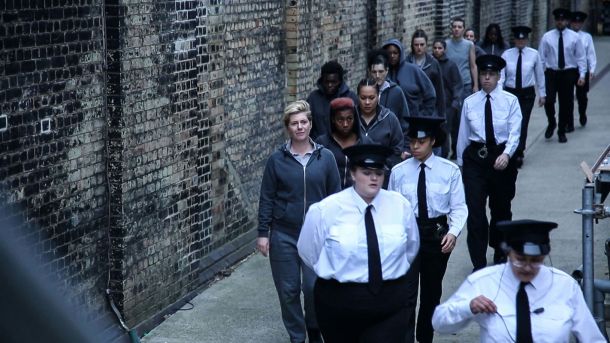
“Julius Caesar” Company. Credit: Helen Maybanks.
Can you talk a bit about why you chose to cast the play as an all-female production and to set it inside of a prison, which is already politicized, as is the play? What informed your decision to take this approach?
So the first thing, to put an all-female production out there in 2012 — and I’m not sure if things have got much better in England — for every job that was going for women in the theater, there were two jobs for a man. Or basically the ratio of men to women working in the theater was two to one.
And I had a number of female colleagues who were amongst the greatest Shakespearean actors of that generation. One of them was Harriet Walter, and she’d really run out of roads in terms of the roles that were available to her in classical theater. And so I had a conversation with her about it and she said to me, “Frankly, I think I’ve got more in common with Brutus in ‘Julius Caesar’ than I have with Cleopatra,” who she’d just played at the Royal Shakespeare Company. So we started talking about Brutus and “Julius Caesar” and committed to doing this production.
And then I began to think about the context and felt that by setting it in a women’s prison, two things can happen. One, it would give me permission to cast any kind of woman, any nationality, any size, any ethnicity, any shape, any voice, and to largely avoid very privileged actresses because there aren’t many privileged people in our jails anyway. And also I thought it would help the audience believe that the character, their obsession with freedom and justice, would be matched by these women in prison, for whom this was the abiding preoccupation.
So it was pragmatic and it was aesthetic. And it wasn’t until we went on to do two more productions that it became, actually, a social mission to put slices of the criminal justice system on our stage.
It was about saying, think about it. Think about your judgment of people and what is their capacity.
And so setting that type of dialogue in the round, how did that come about and what was behind that decision in relation to more of the social and political content of the production?
I’ve always felt that Shakespeare responds very brilliantly to being played in the round because there’s always that outer layer that Shakespeare is sort of putting the action in the context of, whether it’s the parliament or the army or a group of people being asked to bring a statue to life, whatever it is. There is this sense that there is a community out there that is being implicated by the actions, that is witnessing the action.
And certainly in the case of “Caesar,” Caesar’s Senate, the audience suddenly became 400 unpaid extras in my recording of the action, and you could see the audience looking across at each other, across the space, and you knew that somehow they were exposed. You know, when the lights came up and the prison guards came running in, you could feel the tension in the audience because they knew they were being watched by each other.
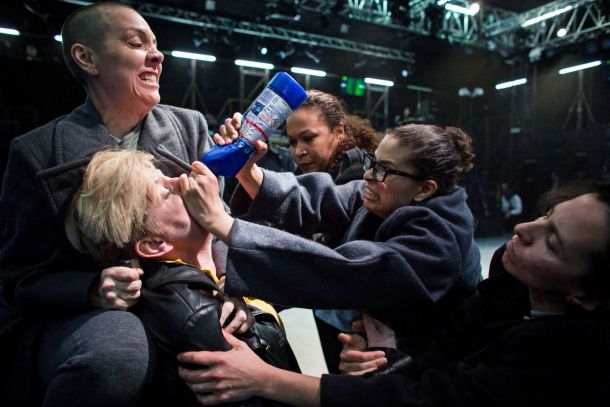
Zainab Hasan (Calpurnia) and Jackie Clune (Julius Caesar) in “Julius Caesar.” Credit: Helen Maybanks.
When Caesar is attacked in this production, the Roman senators use bleach to kill her. And that reminded me of another section of the play, where a donut is used as a torture devise. What was behind your choice to use everyday objects in this way?
One of the actors is an ex-offender, and she came to us from a theater company called Clean Break, which works with ex-offenders. And she helped us to explore the whole thing and try to make our behavior credible and our relationships with each other and with the guards credible. And we asked her, if you were trying to kill someone in prison, what kind of options would be open to you. And one of the things she spoke of was people being poisoned with bleach. Another one, at one point we were going to pour a kettle of boiling water over Caesar first — we were going to actually boil his face.
In the end, it was simplified — just the bleach. But this all came from the prisoners, as did the use of toy weapons, because obviously you know when you go to work in prison you aren’t allowed anything that could even look like a replica weapon, let alone be a weapon.
I kept getting struck about how you can’t really separate the institutional setting and the power dynamics between the prisoners and the play. How did you merge the two?
I think that the premise was that Julius Caessar’s reign was a prison. And the conspirators felt imprisoned by the way in which their freedoms had been circumscribed. They had no freedom of movement. They had no freedom of speech. They weren’t allowed to keep their lands that they’d acquired in foreign wars. And so this mirror of how the conspirators felt in relation to Caesar was a mirror of how the prisoners felt in relation to the regime that they were existing in. And that feeling of instability that you get in a prison when suddenly the guards come in and say you’re being marched off for your medication, or as I found when we worked in prison, people would be taken out of the room to go to court or to go to another prison or to go and see a parole board. And the space that you were standing on was always at risk of being removed from you, like other people needed the room. And so the whole sense of paranoia, terror, fear, danger was mirrored in both landscapes.
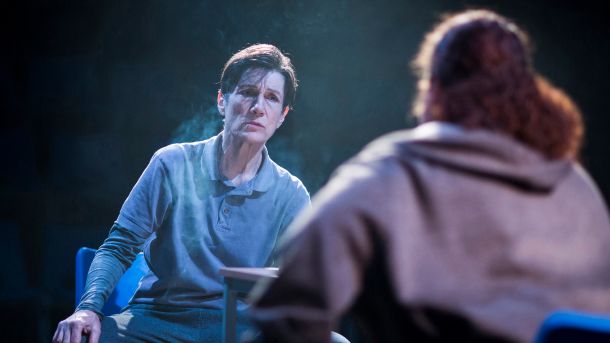
Harriet Walter (Brutus) in “Julius Caesar.” Credit: Helen Maybanks.
At the very beginning, one of the prisoners says, “Working on these Shakespeare plays has really helped me to find my voice.” But then at the end of the play, the wardens come in and everything’s halted before the play gets to finish, and Brutus says, “It’s not even finished.” “We can’t do anything in here.”
Yes. On that subject, an anecdote: Young people have absolutely loved these productions, and I think that one of the most electrifying nights I’ve ever had in the theater was the night that Donald Trump had been elected. And it happened to be a school audience. And at the end of the play, when Harriet Walker called that out, she said — every night that was different, but what you see in this T.V. recording is very much the words she said on the night Donald Trump was elected. She said something like, “The world is going to hell. We can’t do anything in here; you’re going to have to do something.” And the whole audience of young people just stood up and started cheering and it was just so astonishingly live.
This production has spanned quite a bit of time in terms of when it was originally staged and throughout its run. Did you find that the social meaning within the play shifted around different political happenings outside of the theater?
We obviously thought about the toppling of Saddam Hussein, and then as we began rehearsing, Gaddafi had just been overthrown, and Libya was descending into a civil war.
And then, similarly, the Arab Spring occurred and dictators were being toppled and countries were breaking into factions. And I think that we kept on being reminded that Shakespeare’s sort of warning, in a way, of what happens when a leader is disposed unlawfully and what could happen to a country and how it could split apart at the seams, seemed sort of eternally relevant.
This interview has been edited and condensed.

